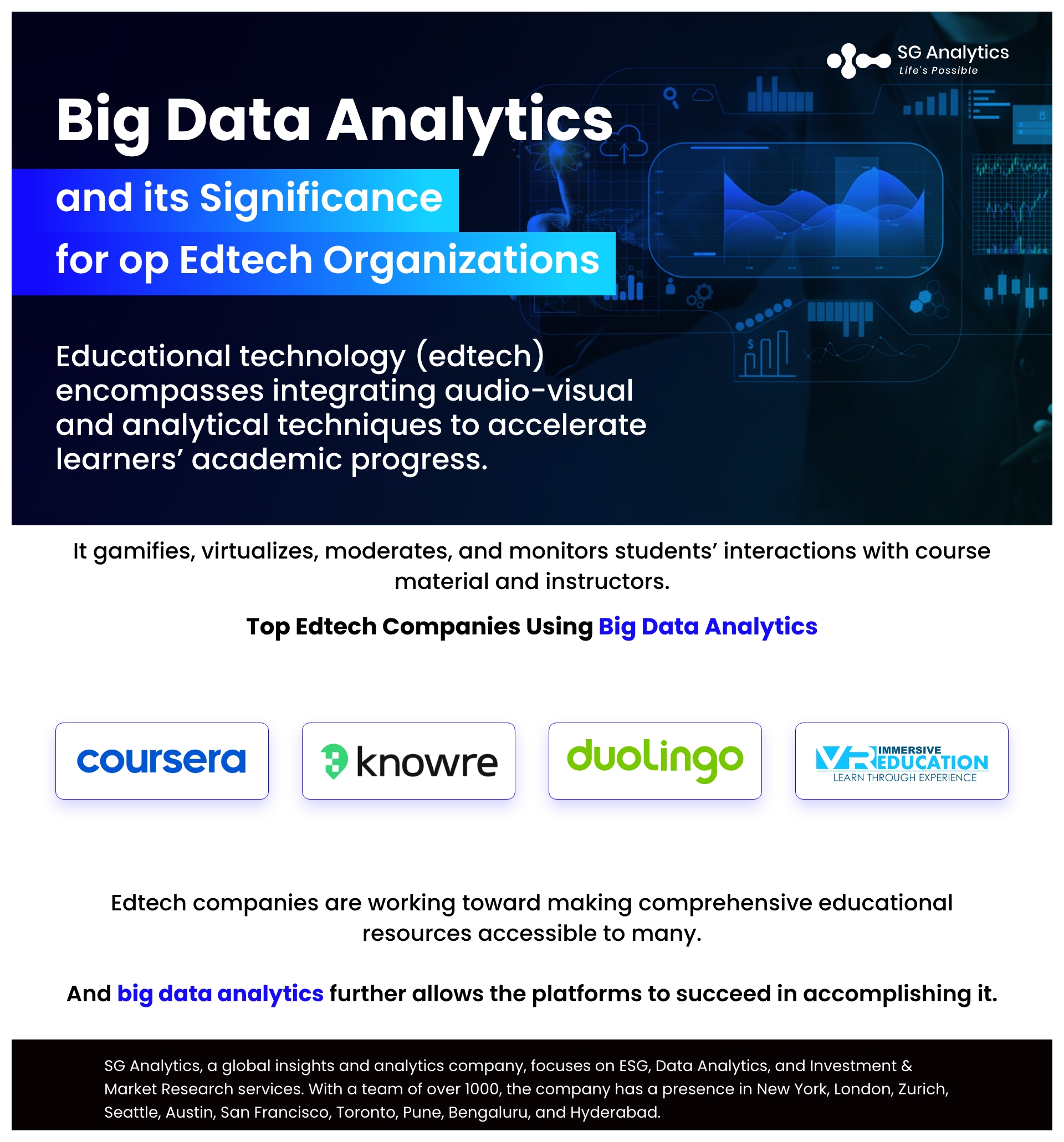Educational institutions and private sector corporations have invested heavily in addressing the skill gap issues affecting employee productivity. However, learners from all age groups require more accessible and personalized courses. Thankfully, analytics can assist educational technology brands in meeting students’ needs. So, this post contains the top edtech companies leveraging big data analytics to create value and modernize teaching.
What is Big Data Analytics for the Edtech Industry?
Big data is an extensive data volume containing texts, images, sounds, audiovisuals, and program-specific files. Businesses manage these ever-expanding databases using data warehouses or lakes. Big data analytics involves determining a recurring pattern based on those repositories’ structured, semi-structured, and unstructured data objects.
Meanwhile, Educational technology, or Edtech, encompasses all the software and hardware innovations that teachers, corporate trainers, and students employ to streamline academic or professional training activities. Therefore, brands working in automated translation, virtual reality (VR) laboratories, or e-libraries are also EdTech businesses.
Still, integrating edtech tools and big data analytics trends varies from company to company. For instance, a smartboard developer will likely use analytical models to explore how educators and learners interact with their hardware. If a company offers remote skill development opportunities, it can employ marketing analytics to attract more students.
What Are the Top Edtech Companies Using Big Data Analytics?
1| Coursera
If you read the Coursera Engineering stories from Medium.com, you will discover engineers at this EdTech enterprise leverage big data analytics to optimize learners’ behavior, course modules, and teaching styles. Coursera also evaluates whether a query entered in the on-platform search box shows relevant results to the students.
Its deep learning incorporates machine learning (ML) and artificial neural network layers. It helps the technical professionals at Coursera to identify the most opportune moments to develop a feedback loop to assist students. Other use cases involving EdTech analytics range from skill benchmarking to course categorization.
Related: 2023 Forecast: How are Emerging Data Analytics Trends Shaping Edtech Globally?

Likewise, data-driven strategies at Coursera prevent at-risk students from ignoring course timeframes using automated and personalized reminders. Therefore, teachers do not have to monitor their learners all the time. It is one of the most reputable EdTech companies that leverage big data analytics to determine how course quality impacts learning outcomes.
Highlights About Coursera
-
Coursera has more than 10 million installations through the Google Play store. It has a 4.8-star rating based on 204,000 reviews.
-
Also, Coursera has the same rating from 105,800 users on the Apple app store.
-
It added 21 million new learner enrollments in 2022, serving consumers, governments, university campuses, and corporations.
-
It has been active since 2012 with Andrew Ng and Daphne Koller, two Stanford professors specializing in computer sciences, as its founders. Moreover, Coursera became a certified B corporation in February 2021.
2| Duolingo
According to VentureBeat, Amazon, and Harvard University, Duolingo is an excellent case study to understand how big data analytics, natural language processing (NLP), and machine learning can bring the world closer. This platform and its software applications focus on helping students and professionals learn multiple languages.
Duolingo’s official blog reveals how it excels at gamifying language skill acquisition. For example, its analytical tools, native to the platform, comprise data visualization dashboards and segmented event tracking. So, the data analysts generate intuitive reports using this EdTech company’s proprietary ecosystem.
They also utilize readily available retention reporting, funnel insights, and experimentation options. An experiment prioritizes A/B testing to encourage data-driven product management. Furthermore, if an experiment indicates underperformance risks, Duolingo’s team revises, repeats, and re-evaluates it.
Highlights About Duolingo
-
This language-learning ecosystem of websites and apps generated 116 million US dollars in revenue in the first quarter of 2023.
-
Duolingo has over 100 courses across 38 languages, catering to the 18-24 age group.
-
Luis von Ahn and Severin Hacker founded it, and this EdTech company has its headquarters in Pittsburgh, Pennsylvania, United States.
-
It has helped more than 575 million individuals develop practical language skills worldwide.
Read also: Top 4 Skills That AI Won’t Replace

3| Knowre
Knowre specializes in personalizing mathematics-related teaching and learning experiences. Its curricula rely on algorithmic estimation of an individual learner’s strengths and weaknesses. Therefore, academic institutions and companies leverage this ed-tech company’s data analytics solutions to accelerate math students’ comprehension.
Each user has unique learning gaps that affect their progress rate. Since mathematics has physical and abstract concepts, a student must approach the questions holistically. At higher education levels, every learner requires judgment and patience to assume multiple values and solve a math problem.
However, a standardized curriculum creates more issues in math education than it solves. So, Knowre employs analytics-led course customizations, enabling teachers to automate learning gap discovery. It is one of the leading edtech companies that leverage big data analytics and offer online accessibility. Today, it collaborates with South Korean and US brands in the edtech industry to impart learner-friendly math skills.
Highlights About Knowre
-
An after-school tutoring academy in Gangnam, Seoul, South Korea, wanted technological tools to enhance the quality of math lessons. In 2008, Knowre’s first iteration came to be. It was December 2012 when this edtech platform raised 1.4 million US dollars from SoftBank Ventures Korea or SBVK.
-
Its headquarter in New York, US, offers public schools and private organizations assistance for mathematics across all the 1 to 12 school grades. Its services also include walkthrough videos to help students understand where they went wrong in a math solution.
Read also: 2023 Outlook: Top Data Analytics Technologies Transforming Organizational Operations
4| Immersive VR Education
This EdTech company has Irish origins and provides virtual reality (VR) experiences optimized for educational purposes. It enables individual professionals and global enterprises to transform conventional teaching-learning methods into more interactive modules.
VR analytics offers insights into how a student interacts with a virtualized environment. Consider historical events or using a piece of equipment in a lab. Children and grownups can benefit from Immersive VR Education’s innovation when studying those events or lab operations. VR in the edtech industry also reduces laboratory hazard risks.
This company has augmented reality (AR) services. AR involves bringing imaginary or virtual objects using the natural world as a reference universe. Assessing AR and VR methods’ effectiveness is challenging since the implementation will vary from classroom to classroom. Thankfully, data analytics allows developers to gather performance and diagnostic data on edtech’s AR-VR integrations.

Highlights About Immersive VR Education
-
It delivers 360-degree video and image captures of physical places. Therefore, students can study geography, culture, travel, and infrastructure utilities from their classrooms or homes.
-
Its ENGAGE platform received several industry recognitions due to its contributions to VR in the edtech and gaming industries.
-
David Whelan founded Immersive VR Education in Waterford, Ireland, in 2014.
Why Do These Edtech Companies Use Big Data Analytics?
The EdTech industry reduces inefficiencies in conventional teaching-learning experiences. The following use cases offer insights into what makes analytics critical for educators, students, parents, corporate trainers, and universities.
Reason 1| Edtech Firms Can Overcome Self-Paced Learning Challenges
Pre-recorded video lectures, computer simulations, live conferences, and interactive question-answer user interfaces have enabled efficient self-learning. Accordingly, Udacity, Udemy, FutureLearn, edX, and many more online education providers prospered.
However, a student is more likely to quit a course once the social and supervisory elements in a traditional schooling environment decrease. This situation arises due to the innate limitations of e-learning or the “learn from home” model.
Related: Post Covid-19 digital transformation trends in education industry
Edtech companies let big data analytics discover the prominent reasons for the premature discontinuation of an individual’s course enrollment. Retaining the self-learners is as tricky as customer retention.
Using analysts’ guidance, educational platforms and teachers can identify behaviors associated with at-risk learners. Later, they can devise creative and personalized intervention strategies to encourage students, helping them complete their certifications.
Reason 2| Edtech Companies Want to Benchmark Subject Proficiencies
Some individuals excel in mathematics but require additional support to study literature. Likewise, two students can exhibit identical academic accomplishments, although their learning pace or style might differ. Moreover, edtech’s comparative analysis involves deciding each course’s minimum, average, and distinction requirements.
Data analytics can inspect:
-
The regional and global educational standards,
-
Changing norms as per the subjects, classes, demographics, and ages.
A benchmark helps describe progress and decline using a constant reference point. So, benchmarking students’ skills is complex. Still, through multivariate models, educators can increase the precision of these benchmarks. They will use the subsequent progress insights to quantify how course modules impact a learner’s progress.

Reason 3| Edtech Analytics Helps Upgrade Curricula for Industry Relevance
Modern data-analytics-as-a-service (DAaaS) assists edtech providers in exploring career and research opportunities in a target market. Therefore, these businesses can recognize the skill gap requiring unique training resources. They will swiftly launch courses or certification programs to meet the industry demand.
Sometimes, e-learning platforms revisit their current lecture series and assignments. They also contemplate whether to remove or update specific modules. Doing so lets the educators and the facilitator platform eliminate incorrect or outdated information.
Finally, edtech platforms can rationalize educators’ compensation, service pricing, and feedback loops by prioritizing in-demand skill development. Updated curricula will help protect students’ faith in the edtech brands and contribute to more outcome-oriented training.
Conclusion - Edtech Companies in USA
Coursera, Duolingo, Knowre, and Immersive VR Education are some of the top edtech companies using big data analytics to improve many students’ learning performances. They extract insights concerning skill gaps, teaching effectiveness, personalization, and students’ behaviors. As a result, their educational strategies rely on data-backed findings, becoming more relevant to students and teachers.
Other edtech companies like GoGaurdian, FutureLearn, Udacity, Byjus, Newsela, Udemy, and edX also benefit from marketing and academic analytics. Given the ongoing skill-job mismatch crisis, these platforms have gained momentum. They also serve corporate clients for mass employee training. Nevertheless, modern analysts can empower them to optimize and automate their content delivery to prenasalize the learner journeys for the best outcomes.
With a presence in New York, San Francisco, Austin, Seattle, Toronto, London, Zurich, Pune, Bengaluru, and Hyderabad, SG Analytics, a pioneer in Research and Analytics, offers tailor-made services to enterprises worldwide.
A leading enterprise in Data Analytics, SG Analytics focuses on leveraging data management, analytics, and data science to help businesses in edtech and other industries discover new insights and craft tailored growth strategies. Contact us today to make critical data-driven decisions, prompting accelerated business expansion and breakthrough performance.
About SG Analytics
SG Analytics is an industry-leading global insights and analytics firm providing data-centric research and contextual analytics services to its clients, including Fortune 500 companies, across BFSI, Technology, Media and entertainment, and Healthcare sectors. Established in 2007, SG Analytics is a Great Place to Work® (GPTW) certified company and has a team of over 1100 employees and has presence across the U.S.A., the U.K., Switzerland, Canada, and India.
Apart from being recognized by reputed firms such as Analytics India Magazine, Everest Group, and ISG, SG Analytics has been recently awarded as the top ESG consultancy of the year 2022 and Idea Awards 2023 by Entrepreneur India in the “Best Use of Data” category.









